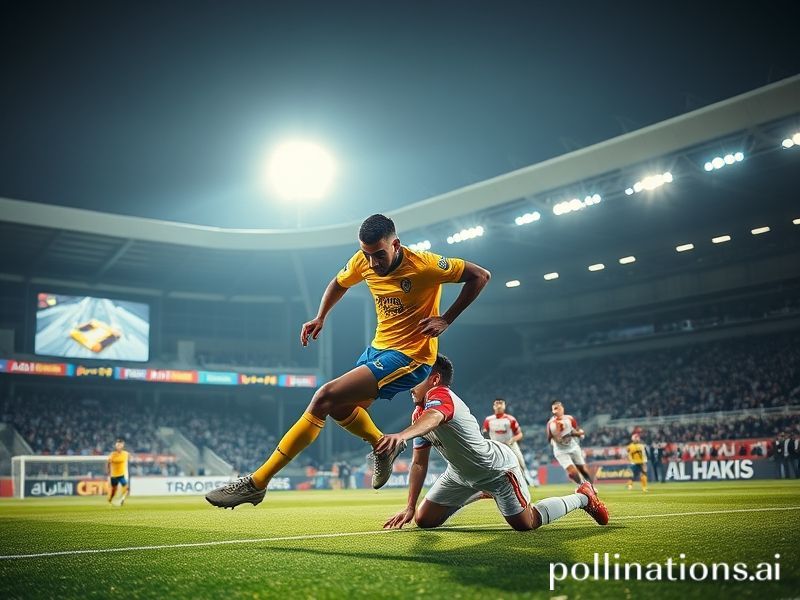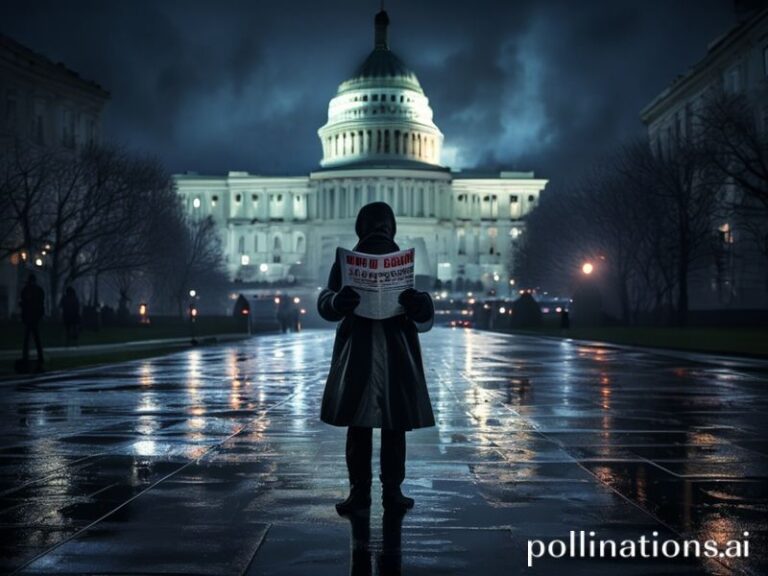Ronaldo vs. The Immortals: Saudi Football’s Latest Soft-Power Spectacle
Last night, in a flood-lit corner of Riyadh that smelled faintly of jet fuel and ambition, Al-Nassr—now essentially a luxury travel agency for Cristiano Ronaldo’s ego—met Al-Kholood, a club whose name translates to “The Immortals.” One side arrived in private jets, the other on a bus that still had sand from the Empty Quarter in its wheel wells. The final score—3-1 for the megastar ensemble—was less a football result than an allegory for late-stage capitalism wearing shin guards.
From an international vantage point, the fixture was a masterclass in geopolitical theatre. The Saudi Pro League has become Riyadh’s newest soft-power export: a glossy, HD distraction from awkward questions about bone saws and oil prices. Each Ronaldo step-over is a tiny diplomatic gesture, like a ribbon-cutting at a new arms fair. Meanwhile, Al-Kholood’s squad—composed largely of players who supplement their wages with post-match kebab endorsements—performed the role of plucky underdog so convincingly that Netflix executives reportedly took notes.
The global implications are deliciously absurd. In Europe, aging superstars now treat the Gulf as a sort of high-net-worth witness-protection program: swap Champions League anthems for tax-free salaries, and voilà—legacy intact, conscience laundered. South American scouts watch these matches like anthropologists, wondering if the next Neymar will emerge from the same suburbs that once gave us only baristas. And in Asia, where football fans wake at ungodly hours to watch grainy streams, the league is a nightly reminder that geography is negotiable but brand reach is not.
The match also showcased the newest frontier in sports-washing: the refereeing VAR screen sponsored by a state-owned oil giant. Every time the official jogged over to squint at a pixelated freeze-frame, viewers were reminded—subtly, of course—that their gasoline habit helped pay for the stadium’s air-conditioning. Meanwhile, the stadium’s LED perimeter boards flipped between adverts for crypto exchanges and luxury watches, both of which promise immortality of sorts: one financial, the other horological. Al-Kholood’s fans, outnumbered but not out-sung, unfurled a tifo reading “We Were Here Before You & We’ll Be Here After,” which could have been a chant or a threat, depending on your reading of regional history.
For the players, the night was a lesson in existential economics. Ronaldo, ever the perfectionist, berated teammates for not pressing high enough against opponents whose annual budget is roughly what he spends on hair gel. Al-Kholood’s goalkeeper, a 34-year-old civil engineer by day, made seven saves that doubled as performance art titled “Resistance Is Futile but Photogenic.” When he finally conceded a third, cameras caught him shrugging with the weary wisdom of a man who knows tomorrow he’s back to designing overpasses.
Yet the broader significance lies not in the scoreline but in the broadcast feed: 180 countries tuned in, according to league officials who count like North Korean election monitors. In Lagos, viewing parties debated whether the Saudi league is progress or parody. In Buenos Aires, sports radio hosts argued that exporting veterans beats exporting coups. And in London’s Mayfair, hedge-fund analysts ran regression models on how many more penalties Ronaldo can score before the market corrects itself.
By full-time, the immortals had been mortally wounded, but the spectacle rolled on. Fireworks spelled “Vision 2030” in the sky, because nothing says sustainable future quite like burning magnesium for entertainment. The crowd dispersed into the desert night, selfies secured, narratives neatly packaged. Somewhere in the locker rooms, Al-Kholood’s players collected their match bonuses—enough, perhaps, to replace the team bus’s faulty air-conditioning—while Al-Nassr’s entourage boarded a fleet of SUVs with tinted windows thick enough to filter out irony.
And so the world turns: empires rise on spreadsheets, legends rent their legacies month-to-month, and a group of semi-pros nicknamed “The Immortals” remind us that even in the age of infinite branding, there’s still something poignantly human about losing beautifully. If that isn’t a metaphor for our times, I’ll eat my press-badge lanyard—lightly grilled, with tahini.







